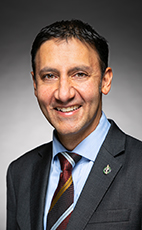Mr. Speaker, I thank my colleague for her statement today and the interventions she has made on this issue.
Obviously on International Women's Day, it is a very timely topic of discussion. This government and my party stand steadfast in solidarity with women in Canada and around the world, including the Yazidi women who were mentioned by my friend, the member for Calgary Nose Hill.
The important piece is that there have been many Yazidi atrocities, despicable, inhumane, and tragic atrocities. We deplore all acts that have been taken in the name of the so-called Islamic State: loathsome murderous actions toward the Yazidi people, toward all people. These terrible attacks have contributed greatly to the Syrian refugee crisis that has captured the attention of governments and people around the world, including here in Canada. It goes without saying that the response to the crisis in Canada has been overwhelming. There has been a complete national effort, a large-scale effort, involving government and non-government actors. It involves private-sector individuals and service-provider organizations.
We are the only country on the planet that has private sponsorship of refugees. As of last week, 8,950 privately sponsored refugees had arrived in this country from Syria, of all different ethnicities, backgrounds, and religions. Those groups span the entire country. There are many groups in my riding itself, such as Roncesvalles Refugee Relief and the Junction Helps. It expands beyond that to include other entities that are assisting with the settlement once people arrive. This is truly the best of the Canadian spirit.
We have had people like Dr. Anna Banerji and the Parkdale Community Health Centre emphasizing and working on positive health outcomes of Syrian refugees. There have been clothing drives by people like Laura-Jean Bernhardson of the Fresh Collective, and the Humbercrest Public School, which did a coat drive. I mention this to emphasize that the care and concern for people affected in the region, including Yazidi people, is shared by this government, but it is also shared by Canadians across the board.
However, there is an important distinguishing feature here, which arose in the minister's original comments in response to my colleague. The point that was made is that we are using the UNHCR to help us target vulnerable groups. The groups it is targeting includes people across all boards and all categories. It specifically includes complete families, persons who are vulnerable due to membership in LGBTI communities, and it also includes women at risk. Let me underscore that one more time. Women at risk are a category we are looking at as vulnerable and that the UNHCR is looking at as vulnerable. That is especially important to underline today, on International Women's Day.
More importantly is that when we bring in Syrian refugees, we do it in a manner that is ethnically and religiously blind. I cannot emphasize this enough. I have said this in the House before, and I will say it again. This stands in stark contrast to the policies of the previous government.
My colleague's party chose to be selective in who was let into this country and who was not. In documents tabled in the House in response to a question on the order paper put forward by the NDP opposition critic, all of our suspicions were confirmed; the previous government targeted religious and ethnic minorities to the detriment of other groups. We are not doing this. We accept any people into this country who meet the Geneva Convention definition of refugee, regardless of their religion, be they minority Yazidis or majority Sunni Muslims. Religious hierarchies have no place in this government or this country, and we are ending that kind of policy.

